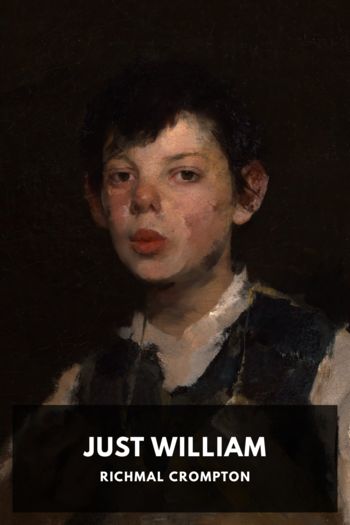Just William - Richmal Crompton (have you read this book .TXT) 📗

- Author: Richmal Crompton
Book online «Just William - Richmal Crompton (have you read this book .TXT) 📗». Author Richmal Crompton
It was very tiring; William wondered if people would be sorry if he dropped down dead.
I have said that William did not know where he was going.
But Fate knew.
The picnickers walked down the hill from the little station to the river bank. It was a beautiful morning. Robert, his heart and hopes high, walked beside his goddess, revelling in his nearness to her though he could think of nothing to say to her. But Ethel and Mrs. Clive chattered gaily.
“We’ve given William the slip,” said Ethel with a laugh. “He’s no idea where we’ve gone even!”
“I’m sorry,” said Miss Cannon, “I’d have loved William to be here.”
“You don’t know him,” said Ethel fervently.
“What a beautiful morning it is!” murmured Robert, feeling that some remark was due from him. “Am I walking too fast for you—Miss Cannon?”
“Oh, no.”
“May I carry your parasol for you?” he enquired humbly.
“Oh, no, thanks.”
He proposed a boat on the river after lunch, and it appeared that Miss Cannon would love it, but Ethel and Mrs. Clive would rather stay on the bank.
His cup of bliss was full. It would be his opportunity of sealing lifelong friendship with her, of arranging a regular correspondence, and hinting at his ultimate intentions. He must tell her that, of course, while he was at college he was not in a position to offer his heart and hand, but if she could wait—He began to compose speeches in his mind.
They reached the bank and opened the luncheon baskets. Unhampered by Robert the cook had surpassed herself. They spread the white cloth and took up their position around it under the shade of the trees.
Just as Robert was taking up a plate of sandwiches to hand them with a courteous gesture to Miss Cannon, his eyes fell upon the long, white road leading from the village to the riverside and remained fixed there, his face frozen with horror. The hand that held the plate dropped lifelessly back again on to the tablecloth. Their eyes followed his. A curious figure was cycling along the road—a figure with blackened face and a few drooping feathers on its head, and a doormat flying in the wind. A crowd of small children ran behind cheering. It was a figure vaguely familiar to them all.
“It can’t be,” said Robert hoarsely, passing a hand over his brow.
No one spoke.
It came nearer and nearer. There was no mistaking it.
“William!” gasped four voices.
William came to the end of the road. He did not turn aside to either of the roads by the riverside. He did not even recognise or look at them. With set, colourless face he rode on to the river bank, and straight amongst them. They fled from before his charge. He rode over the tablecloth, over the sandwiches, patties, rolls and cakes, down the bank and into the river.
They rescued him and the bicycle. Fate was against Robert even there. It was a passing boatman who performed the rescue. William emerged soaked to the skin, utterly exhausted, but feeling vaguely heroic. He was not in the least surprised to see them. He would have been surprised at nothing. And Robert wiped and examined his battered bicycle in impotent fury in the background while Miss Cannon pillowed William’s dripping head on her arm, fed him on hot coffee and sandwiches and called him “My poor darling Red Hand!”
She insisted on going home with him. All through the journey she sustained the character of his faithful squaw. Then, leaving a casual invitation to Robert and Ethel to come over to tea, she departed to pack.
Mrs. Brown descended the stairs from William’s room with a tray on which reposed a half-empty bowl of gruel, and met Robert in the hall.
“Robert,” she remonstrated, “you really needn’t look so upset.”
Robert glared at her and laughed a hollow laugh.
“Upset!” he echoed, outraged by the inadequacy of the expression. “You’d be upset if your life was ruined. You’d be upset. I’ve a right to be upset.”
He passed his hand desperately through his already ruffled hair.
“You’re going there to tea,” she reminded him.
“Yes,” he said bitterly, “with other people. Who can talk with other people there? No one can. I’d have talked to her on the river. I’d got heaps of things ready in my mind to say. And William comes along and spoils my whole life—and my bicycle. And she’s the most beautiful girl I’ve ever seen in my life. And I’ve wanted that bicycle for ever so long and it’s not fit to ride.”
“But poor William has caught a very bad chill, dear, so you oughtn’t to feel bitter to him. And he’ll have to pay for your bicycle being mended. He’ll have no pocket money till it’s paid for.”
“You’d think,” said Robert with a despairing gesture in the direction of the hall table and apparently addressing it, “you’d think four grown-up people in a house could keep a boy of William’s age in order, wouldn’t you? You’d think he wouldn’t be allowed to go about spoiling people’s lives and—and ruining their bicycles. Well, he jolly well won’t do it again,” he ended darkly.
Mrs. Brown, proceeded in the direction of the kitchen.
“Robert,” she said soothingly over her shoulder, “you surely want to be at peace with your little brother, when he’s not well, don’t you?”
“Peace?” he said. Robert turned his haggard countenance upon her as though his ears must have deceived him. “Peace! I’ll wait. I’ll wait till he’s all right and going about; I won’t start till then. But—peace! It’s not peace, it’s an armistice—that’s all.”
III William




Comments (0)